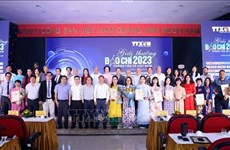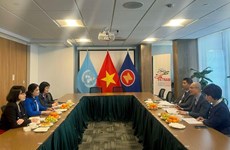UNDP releases human progress report
The United Nations Development Programme (UNDP) released the
Asia-Pacific Human Development Report 2012, entitled “A planet to share –
Sustaining human progress in a changing climate” in Hanoi on May
15.
The United Nations Development Programme (UNDP) released the
Asia-Pacific Human Development Report 2012, entitled “A planet to share –
Sustaining human progress in a changing climate” in Hanoi on May
15.
Addressing the launch event, UNDP Deputy Country Director Bakhodir Burkhanov said people in the Asia-Pacific, especially the poor, face a number of complex impacts from climate change, such as changing rainfall patterns, drought, flood and rising sea levels.
The report said Asia-Pacific countries should change their methods of production, especially seeking better ways to create and use energy in a more effective and greener manner for production, such as using more renewable energy, lower-carbon technology and less fossil fuel.
Also according to the report, as many as 543 Vietnamese small and medium-sized enterprises in five key industries are receiving technical and financial assistance from an energy preservation project. It helped them reduce carbon dioxide emission by 944,000 tonnes by the end of 2011, through using more modern kilns for producing brick and pottery products.
Regional countries are also asked to develop greener agriculture, including improving rice production through using water more effectively, boosting the development and usage of renewable energy and photo-electric technology in households, and protecting means of livelihood among the rural and urban poor, who are more vulnerable to shocks in case of natural disaster or flood.
At the event, Prof. Dao Xuan Hoc, Deputy Chairman of the National Committee on Climate Change said with an area of 3.9 million hectares and a population of almost 17.5 million people, the Mekong Delta will be one of areas hardest hit by climate change, with direct consequences such as broken sea and river dikes, prolonged flood in lower areas and tropical storms.
In an effort to overcome challenges facing the Mekong Delta, Vietnam has cooperated with many countries. In particular, the Netherlands chose the region as a model for a comprehensive plan against climate change.-VNA
Addressing the launch event, UNDP Deputy Country Director Bakhodir Burkhanov said people in the Asia-Pacific, especially the poor, face a number of complex impacts from climate change, such as changing rainfall patterns, drought, flood and rising sea levels.
The report said Asia-Pacific countries should change their methods of production, especially seeking better ways to create and use energy in a more effective and greener manner for production, such as using more renewable energy, lower-carbon technology and less fossil fuel.
Also according to the report, as many as 543 Vietnamese small and medium-sized enterprises in five key industries are receiving technical and financial assistance from an energy preservation project. It helped them reduce carbon dioxide emission by 944,000 tonnes by the end of 2011, through using more modern kilns for producing brick and pottery products.
Regional countries are also asked to develop greener agriculture, including improving rice production through using water more effectively, boosting the development and usage of renewable energy and photo-electric technology in households, and protecting means of livelihood among the rural and urban poor, who are more vulnerable to shocks in case of natural disaster or flood.
At the event, Prof. Dao Xuan Hoc, Deputy Chairman of the National Committee on Climate Change said with an area of 3.9 million hectares and a population of almost 17.5 million people, the Mekong Delta will be one of areas hardest hit by climate change, with direct consequences such as broken sea and river dikes, prolonged flood in lower areas and tropical storms.
In an effort to overcome challenges facing the Mekong Delta, Vietnam has cooperated with many countries. In particular, the Netherlands chose the region as a model for a comprehensive plan against climate change.-VNA












